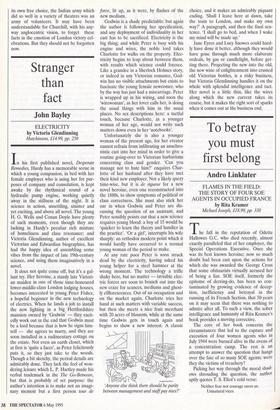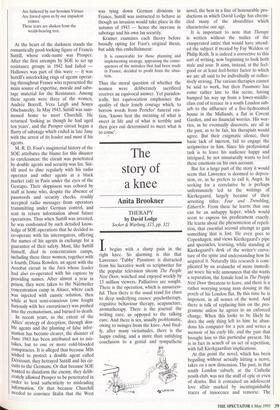To betray you must first belong
Andro Linklater
FLAMES IN THE FIELD: THE STORY OF FOUR SOE AGENTS IN OCCUPIED FRANCE by Rita Kramer Michael Joseph, £18.99, pp. 338 The fall in the reputation of Odette I iallowes G.C. who died recently, almost exactly paralleled that of her employer, the Special Operations Executive. Once she was its best known heroine; now so much doubt had been cast upon the actions for which she was awarded the George Cross that some obituarists virtually accused her of being a liar. SOE itself, formerly the epitome of derring-do, has been so con- taminated by growing evidence of decep- tion, inefficiency and betrayal in the running of its French Section, that 50 years on it may seem that there was nothing to admire after all. To such a view, the sober intelligence and humanity of Rita Kramer's book provides a moving corrective.
The core of her book concerns the circumstances that led to the capture and execution of four women agents who in July 1944 were burned alive in the ovens of a concentration camp. The rest is an attempt to answer the question that hangs over the fate of so many SOE agents: were they the victims of treachery? Picking her way through the moral shad- ows shrouding the question, the author aptly quotes T. S. Eliot's cold verse:
Neither fear nor courage saves us. Unnatural vices Are fathered by our heroism.Virtues Are forced upon us by our impudent crimes.
These tears are shaken from the wrath-bearing tree.
At the heart of the darkness stands the romantically good-looking figure of Francis Suttill, whose code-name was Prosper. After the first attempts by SOE to set up resistance groups in 1942 had failed — Hallowes was part of this wave — it was Suttill's interlocking rings of agents operat- ing throughout France who represented the main source of expertise, morale and sabo- tage material for the Resistance. Among these agents were three of the women, Andree Borrell, Vera Leigh and Sonya Olschanezky. In May 1943, Suttill was sum- moned home to meet Churchill. He returned 'looking as though he had aged ten years', and the Prosper circuit began a flurry of sabotage which ended in late June with the arrest of its leader and most if his agents.
M. R. D. Foot's magisterial history of the SOE attributes the blame for this disaster to carelessness: the circuit was penetrated by double agents and security was lax. Sut- till used to dine regularly with his radio operator and other agents at a black market café in Paris under the eyes of the Gestapo. Their sloppiness was echoed by staff at home who, despite the absence of passwords and security checks, readily accepted radio messages from operators transmitting under German control, and sent in return information about future operations. Thus when Suttill was arrested, he was confronted by such detailed know- ledge of SOE operations that he decided to co-operate with his interrogators, offering the names of his agents in exchange for a guarantee of their safety. Most, like Suttill himself, died in concentration camps, including these three women, together with a fourth, Diana Rowden, an agent with the Acrobat circuit in the Jura whose leader had also co-operated with his captors by providing names. After almost a year in prison, they were taken to the Natzweiler concentration camp in Alsace, where each was injected with caustic solution, then while at best semi-conscious (one fought furiously with her executioner) was pushed into the crematorium, and burned to death.
In recent years, as the extent of the Allies' strategy of deception, through dou- ble agents and the planting of false infor- mation has become clearer, the disaster of June 1943 has been attributed not to mis- takes, but to one or more cold-blooded conspiracies. It is alleged that because MI6 wished to protect a double agent called Dericourt, they betrayed Suttill and his cir- cuits to the Germans. Or that because SOE wanted to disinform the enemy, they delib- erately allowed Prosper to be penetrated in order to lend authenticity to misleading Information. Or that because Churchill needed to convince Stalin that the West was tying down German divisions in France, Suttill was instructed to behave as though an invasion would take place in the autumn of 1943 — hence the increase in sabotage and his own lax security.
Kramer examines each theory before broadly opting for Foot's original thesis, but adds this embellishment:
It is conceivable for those planning and implementing strategy, appraising the conse- quences of the mistakes that had been made in France, decided to profit from the situa- tion.
Thus the moral question of whether the women were deliberately sacrificed receives an equivocal answer. Yet paradox- ically, her equivocation emphasises the quality of their lonely courage which, to borrow words from Pericles' funeral ora- tion, 'knows best the meaning of what is sweet in life and of what is terrible and then goes out determined to meet what is to come'.



































































 Previous page
Previous page